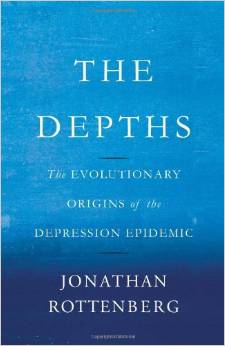This is part of an ongoing series of reviews here at GPS. These will be (to the best of my ability) spoiler-free, so as not to ruin the fiction ones I do, as well as relatively brief. I won’t just be reviewing “skeptical” works, but instead a large portion of what I read. I’m a voracious reader, even when I am swamped with other work (it’s what I tend to do instead of watch television), so I’ll probably put out one every couple of weeks. If you’re interested, I’ve actually been tracking exactly what I’ve read (book and GN-wise, anyway) for over the past four years on LibraryThing.
GPS Review: “The Depths: The Evolutionary Origins of the Depression Epidemic” by Jonathan Rottenberg
 Full disclosure: I was sent a free copy of this book from the publisher earlier this year, given that this (psychopathology) is my field of study and what I teach about.
Full disclosure: I was sent a free copy of this book from the publisher earlier this year, given that this (psychopathology) is my field of study and what I teach about.
Jonathan Rottenberg, PhD is a clinical psychologist and professor at the University of South Florida, where he directs the Mood and Emotion Laboratory. In addition, he also writes a column for Psychology Today and is a Tweeter. Rottenberg has been making waves over the past decade for some very interesting work in the realm of experimental psychopathology, particularly in the area of depression. One of the reasons I’ve found his work interesting is that he has a keen eye towards evolutionary explanations for psychopathology, an area that sorely under examined. He’s recently published his second book, his first for a lay audience (the other was a quite well received academic text called Emotion and Psychopathology: Bridging Affective and Clinical Science), which is a synthesis of his work and others in the area of mood science, particularly as it relates to depression.
First off, I found Rottenberg’s writing style to be extremely easy to read. He’s skilled at taking complex academic ideas (and their resultant psychological jargon) and translating them into concepts understandable to the general public (for those like me that might want to read the original research, the book is also very heavily sourced – over 40 pages of footnotes). He’s also not afraid to show how and why much of the “typical” thinking about depression is not just wrong, but massively flawed and not supported by the weight of evidence. This is not a “self-help” book of the typical sort, which offers pat and simple explanations for why someone is depression and then simple solutions. In fact, Rottenberg is quick to point out that depression has a multitude of potential causes, courses, and ways to overcome it.
The key problem with “typical” ideas about depression he tries to dispel is that it is a) a disease and b) evidence of some sort of fundamental flaw in an individual (e.g., that you have a “chemical imbalance”). Instead of this “defect model,” which is the model which informs modern psychiatry and it’s diagnostic system, Rottenberg examines depression from an evolutionary perspective, drawing from the latest advances in affective science. Rather than a disease, he sees depression as a natural response to certain situations – those that prevent us from working towards evolutionarily desired goals (e.g., a mate, security, a rewarding career) – just as an elevated mood is a natural response to a positive event in one’s life. In fact, he writes, low mood is a natural and useful response when we are stymied in pursuit of such goals, but as with many evolutionarily beneficial processes, it can be hijacked and end up causing non-useful, damaging levels of depressive symptoms (what one might call “Major Depressive Disorder” in a diagnostic sense). From there, Rottenberg spends the majority of the book examining how an evolutionary-informed perspective helps to make sense of what we know about depression, both in terms of severe and low-grade disruptions.
I found this to really be an excellent, insightful book that doesn’t speak down to it’s audience but also doesn’t dumb down complex information. It, and a number of other recent books from clinical psychologists (some of which I’ll be reviewing shortly), really speak to an increasing dissatisfaction with the “medical model of mental illness” and show the shortcomings of treating mental health problems as a intra-individual disease. Books like this are an important part of educating the public that difficulties with depression, anxiety, and the like aren’t just a “chemical imbalance” which can be cured with a pill that can make a sad onion happy, but instead can be the result of normal, useful processes gone awry (my upcoming book on OCD, for instance, outlines an evo-bio-psychosocial etiology for that particular problem).
I applaud Rottenberg’s attempt to reach the masses, and hope that his book will indeed spark a national conversation about what depression is and what we as a society need to do to combat it.
For some excerpts from the book, check out the review on Brain Pickings
Buy Rottenberg’s The Depths: The Evolutionary Origins of the Depression Epidemic from Amazon now.
